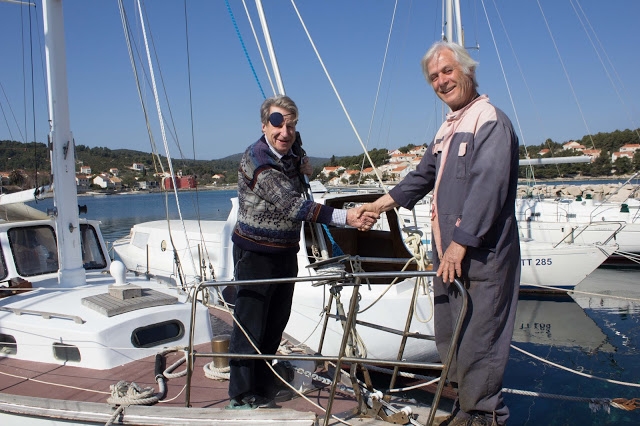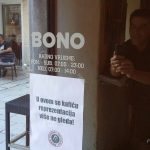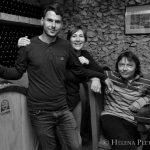
“As I was the first to begin producing Grk, and the old saying says no one got famous in his own village, such was the case with my Grk”
He is 90 years old, has a patch over his right eye, but is so vital that even his age doesn’t prevent him from coming in March to Lumbarda on Korčula Island to prepare his wooden sailboat for a summer Adriatic cruise. He is Uwe Kitzinger, a great friend of Croatia, well-known in England, where he arrived as a refugee from Germany in 1939, becoming the first British Economist in the Council of Europe in Strasbourg, appointed in 1951 as secretary of the Economic Council. Uwe’s biography is brimming, from a guest professor at the International Relations department at the West Indies University, advisor at the Rockefeller Foundation for training diplomats and economists for their posts in newly founded Caribbean nations, guest professor in Harvard, where he took over from Henry Kissinger the seminar on European Politics, founder of Templeton College in Oxford… He founded, and was first president, of an association which spearheaded the funding efforts for large projects such as La Manche tunnel, also initiating with his late wife in 1991 the campaign “Lentils for Dubrovnik” which collected and sent humanitarian aid to refugees in Croatia.
This great love for Croatia is a consequence of a dramatic night over 35 years ago, when Uwe’s inexperienced crew caused his sailboat to run aground and sink to 40 metres of depth near Bisače Island close to Lumbarda. Uwe was saved by Branimir Cebalo, then an employee of the local post office on Korčula, who was nearby and gave up on pulling his nets from the sea…
“I went with my father to raise the nets, as a storm was coming. Behind Bisače Island we saw a mast at an angle, not straight and everything was clear. We headed straight there, the sailboat was on the outside, where the winds were strong. We did not ponder the nets and the fish, hasty action was needed, especially when we came close and saw the stranded sailboat had several people on it. My sister was on another boat and went to get help right away,” recalls Branimir the events which made Uwe a great promoter of the Lumbarda variety Grk in the world.
Branimir and his father moved swiftly to the local ferry between Korčula and Pelješac peninsula, asking the crew to sail and save the sailboat ahead of the storm. The ferry came along, but when they pulled the sailboat from the rocks, it sank due to the size of the hole.
“Uwe watched all this from the ferry, we had not met yet then. But when he heard about us on the ferry, he invited me that evening to the Adio Mare restaurant in Korčula town, to thank me for everything we did in order to save him, his crew and the sailboat. Later he told us that he had a truly poor crew, the sole to blame for the shipwreck. The engine was down so they set sail, going from Mljet Island to Korčula during the night. The Korčula channel archipelago was unknown to them and they decided to sail until dawn. In any case, their boat ended up at the bottom and the ferry company told him there was nothing else to be done and to collect money from insurance. I told him that is out of the question and that he cannot leave the boat there, as there is oil, and pulling it out is not impossible. He was confused, but convinced by my arguments. I found two local professional divers, hired the ferry and took two weeks leave. With a lot of trouble we raised the sailboat and dragged it to the shipyard where it was repaired. It still sails today!”
Branimir today claims that everything that went on then, 35 years ago in the rescue of the sailboat, led to their great bonding, with the Lumbarda marina becoming Uwe’s port of call from which every year he starts his Adriatic cruises. Branimir and Uwe became great friends.
“Uwe is somebody in England and their political and economic establishment. He is among the few who brought England to the European Union, and now, with everything around Brexit, he is probably among the saddest Englishmen. Once I asked him how he got into politics, answering he studied economics and saw that politicians don’t listen to economists, wanting to change the situation by example and give politics some economic sense. He was esteemed everywhere. I told him in the 1980s what would happen in our region, but he could not believe that. When the war began, I was at liberty to call him when our hotels were full of refugees and ask if he could anything to help. He told me he owes me plenty, that he can do plenty and that is the least he can do for me. Together with his wife Sheila, with whom he has five daughters, he sent five tonnes of food, medicines and everything we needed. He also fell in love with our Grk and promoted it around the world! He always told me he likes red wines, but Grk is above all of them. When he is here, he most often drinks Grk.”
The story of Uwe Kitzinger and its dramatic opening, suits Branimir well in describing how difficult it was in mid 1980s to start a private wine story in former Yugoslavia.
“After everything I went through, without any thinking, I claim it was easier to pull Uwe’s boat from the bottom than to produce a wine with my own label! It took me five years of sailing through administration and paperwork to make a study which can today be complete in a month. I made my first bottled wine in 1991. It was five years of harassment, with the procedure such that tiny details were meant to dissuade individuals from going into private business. I don’t recall how many commissions came and monitored the study being created which should have made me the first winemaker south of Zagreb who made a wine with his own label.”
Branimir studied to be an electrician, spent six years in Canada doing just that, getting a job at the post office upon his return and spending 20 years there. He sailed into his wine story just ahead of his retirement. His father was weak and he did not want to be the one who would “break the family tradition over some job in the post office, no matter how good and well paid.”
“My father was among the larger grape producers, who also suggested to the Agricultural Cooperative Blato to take Grk and elevate the variety to a higher level, as private growers could not do so then. I inherited from him a hectare of vineyards which I still have today! I did not expand, working on raising the quality, not vineyards. Kids were small, I was alone and did not want to bother, as I did not know how it would all go down.”
Although Branimir was a pioneer in restoring the production of Grk and synonym for the story, it sounds incredible that in all of Lumbarda there is not one sign to his winery.
“As I was the first to begin producing Grk, and the old saying says no one got famous in his own village, such was the case with my Grk. I was the first to offer bottled Grk, blindly believing that locals would be thrilled to have wine in their place, and it turned out different – there was no interest in Lumbarda or the entire island for my Grk. Then I had to go farther, to Split and Dubrovnik, where I sold wine without problems. It sold so well that they asked for more. I still have those customers today, getting rid of non-payers, with the same distributors from day one. And that’s it. My wine is mostly sold in advance and I have no need to set up signs, as I have nothing to sell on my doorstep. And tastings would take up a lot of time, nothing to gain there.”
His winery is near the St. Roko church from the main road or if you like to walk the fields, you can pass through a wonderful stone gate which his friend, artist Krešo Skorzet called the “ceremonial entrance to the wine world.” This gate, dominating the Grk, Opolo and Plavac labels of Cebalo Winery, is probably the only structure on the property not built personally by Branimir.
“Even these columns in the garden which associate many incorrectly of Greece, are my work, I am proud of the flowers and leaves I sculpted on them. I like to play with stone. Lumbarda is known as a stone mason village, stone travelled from here around the world.”
At the time when Branimir went with his father to gather nets and save Uwe, he was a passionate fisherman. Snorkelling and scuba diving “all my youth,” with his largest trophy a huge grouper of 40 kilograms!
“There was no fear, fish were plenty. Now I don’t find it so fun anymore. I smile when I remember those days.”
After one such dive Branimir decided to put into practice the idea his father repeated as a mantra for years to chiefs of the Agricultural Cooperative Blato, which bought all the Grk on the island.
“I pondered my father’s words for a long time, the Agricultural Cooperative Blato never did anything to raise the quality of the variety we were convinced can be our pride. Furthermore, they used Grk to raise the quality of their bad wines from other varieties. On the other hand, the payment was also poor, we would get paid after two years, you can imagine the amount with all that inflation. Someone once said that after two years his entire crop was worth one tobacco box. I said no more of that. It did not make sense and I decided to start my own wine story, raise the quality of Grk and prove to everyone the variety was unreasonably underrated all those years. If it wasn’t for father’s vision in which I believed strongly, I may not have endured all those years struggling for paperwork as the precondition to enter the world of private winemaking. Don’t forget, I was among only a few who went into private winemaking in the former state.”
Branimir held out, got all the papers and through his effort brought to his native Lumbarda the title of Grk capital, a variety which became in a short period one of the most prominent items of Korčula and Dalmatia.
For the original and more from Vinske Priče blog on wine, click here.











